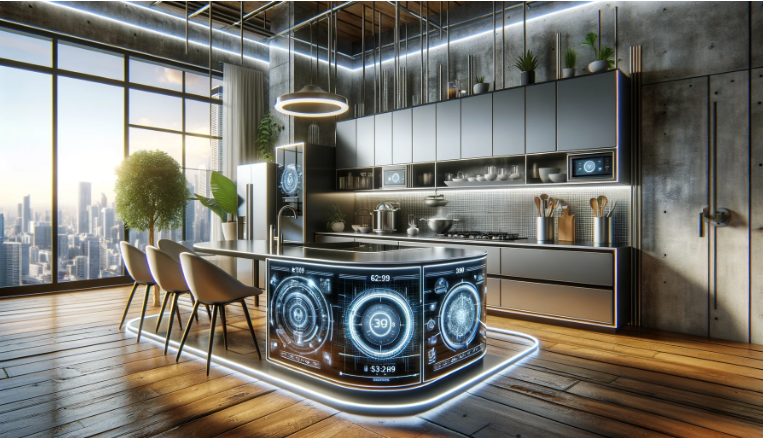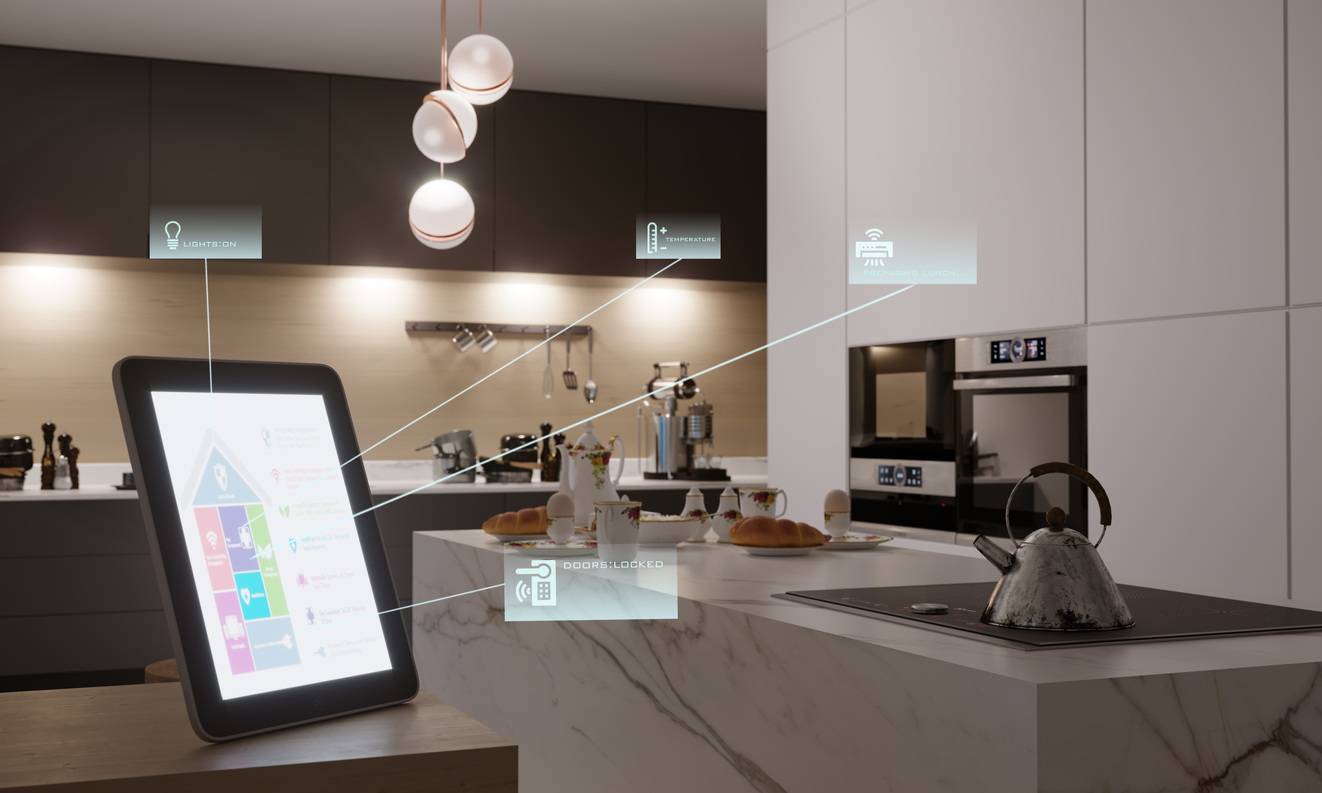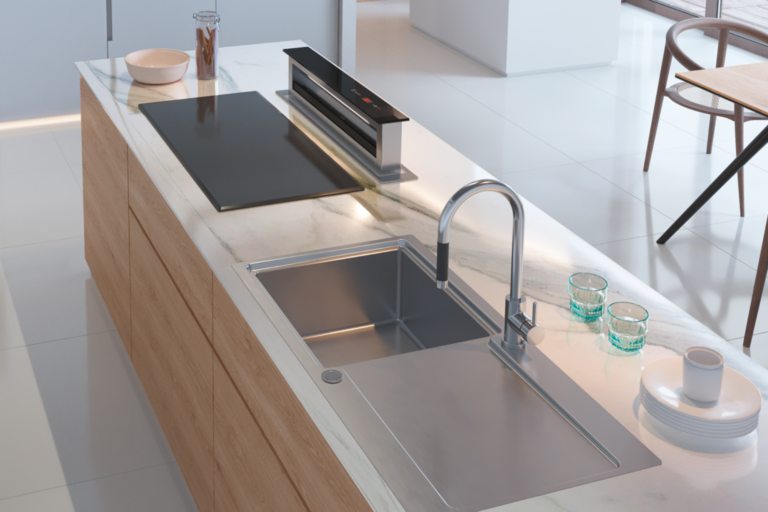The kitchen, once merely a space for cooking, has evolved into a central hub of the modern home. With the rapid advancements in technology, the concept of a “smart kitchen” has become a reality, offering unprecedented levels of convenience, efficiency, and customization. As we move into 2024, smart kitchen technology continues to advance, bringing new trends that are transforming how we prepare food, manage our homes, and even interact with our appliances. This comprehensive guide will explore the top smart kitchen technology trends of 2024, offering insights into how these innovations are reshaping the culinary landscape.
AI-Powered Cooking Assistants
Artificial Intelligence (AI) has permeated various aspects of our lives, and now it’s making significant strides in the kitchen. AI-powered cooking assistants are one of the most exciting developments in smart kitchen technology for 2024. These assistants are designed to enhance the cooking experience by offering personalized recipe suggestions, guiding users through cooking processes, and even adapting recipes based on dietary restrictions or preferences.
One of the most notable examples is Samsung’s Bespoke AI Oven, which uses AI to recognize the food inside and suggest optimal cooking settings. Similarly, LG’s ThinQ platform integrates AI to provide personalized cooking experiences, from suggesting recipes based on what’s in your fridge to automatically adjust cooking times and temperatures.
These AI-powered systems learn from user behavior, preferences, and habits, making them more intuitive and helpful over time. They can recommend recipes based on what you have in your pantry, suggest healthier alternatives, or even adjust cooking methods to suit your tastes. As AI continues to evolve, we can expect these cooking assistants to become even more sophisticated, making cooking easier, faster, and more enjoyable.
Integration of Smart Appliances with Home Ecosystems

The trend of integrating smart kitchen appliances into broader home ecosystems is gaining momentum in 2024. This trend is part of the larger movement towards creating a fully connected smart home, where all devices work seamlessly together. The integration of smart kitchen appliances with platforms like Apple HomeKit, Amazon Alexa, and Google Home allows for a unified and streamlined user experience.
For example, imagine starting your morning by asking your voice assistant to brew coffee, preheat the oven, and adjust the lighting in the kitchen—all with a single command. This level of integration allows for greater convenience and efficiency, enabling users to control multiple devices simultaneously.
Moreover, these platforms are increasingly focusing on interoperability, meaning that appliances from different brands can work together within the same ecosystem. This is a significant advancement, as it allows consumers to mix and match devices based on their preferences without being locked into a single brand’s ecosystem.
Sustainability and Eco-Friendly Features
As concerns about climate change and environmental sustainability grow, consumers are increasingly looking for ways to reduce their carbon footprint. In response, manufacturers are developing smart kitchen appliances with sustainability and eco-friendliness in mind. This trend is set to dominate the smart kitchen landscape in 2024.
Energy efficiency is a key focus, with many smart appliances now featuring energy monitoring capabilities. These devices allow users to track their energy consumption in real time, providing insights into how they can reduce their usage and save on electricity bills. For instance, smart refrigerators can adjust their cooling cycles based on the time of day or when they’re most frequently accessed, thereby reducing energy waste.
Water-saving features are also becoming more common, particularly in smart dishwashers. These appliances optimize water usage based on the load size and the level of soiling, ensuring that water is used efficiently. Some even recycle the last rinse cycle’s water for the next wash, further conserving resources.
Additionally, there’s a growing emphasis on using sustainable materials in the manufacturing of smart kitchen appliances. Companies are exploring eco-friendly alternatives to traditional plastics and metals, and some are even offering take-back programs for recycling old appliances.
Voice-Controlled Appliances and Hands-Free Operations
Voice control has become a staple of the smart home, and it’s increasingly making its way into the kitchen. In 2024, voice-controlled appliances are more prevalent than ever, allowing for hands-free operation and making kitchen tasks easier and more efficient.
With voice assistants like Amazon Alexa, Google Assistant, and Apple’s Siri, users can control their kitchen appliances using simple voice commands. For example, you can ask your voice assistant to preheat the oven, start the dishwasher, or even brew a pot of coffee without lifting a finger. This is particularly useful when your hands are full or messy during cooking.
Voice control isn’t just about convenience; it also adds a layer of accessibility for individuals with disabilities or mobility issues. Being able to operate kitchen appliances without the need for physical interaction can make a significant difference in their daily lives.
The future potential of voice control in kitchen automation is vast. As voice recognition technology improves, we can expect even more intuitive and responsive interactions with our kitchen appliances. This could include more complex multi-step commands, such as asking your assistant to set the oven to a specific temperature, start a cooking timer, and notify you when the dish is ready.
Advanced Food Storage and Inventory Management
Smart refrigerators have come a long way, and in 2024, they’re more intelligent and feature-rich than ever. One of the most notable trends is the integration of advanced food storage and inventory management systems, which help users reduce food waste and streamline their grocery shopping.
These refrigerators come equipped with cameras and sensors that monitor the contents of your fridge in real-time. The associated app can track expiration dates, alert you when food is about to go bad, and even suggest recipes based on what you have on hand. This not only helps in reducing food waste but also ensures that you always have fresh ingredients ready for your meals.
Additionally, smart refrigerators are now integrated with grocery delivery services. When you’re running low on certain items, the refrigerator can automatically add them to your shopping list or even place an order for you. This seamless integration makes it easier to manage your household’s food supply and ensures you never run out of essentials.
Some models also feature smart compartments that can adjust their temperature and humidity settings based on the type of food being stored. This helps in preserving food for longer, ensuring that fruits, vegetables, and other perishables stay fresh.
Smart Cooking Devices and Precision Cooking
Precision cooking is becoming a central theme in smart kitchen technology. As consumers seek more control over their cooking processes, manufacturers are developing devices that allow for exact temperature and time control, ensuring perfect results every time.
Sous-vide machines, smart induction cooktops, and advanced air fryers are leading the charge in precision cooking. These devices allow users to cook food at precise temperatures, resulting in consistent and restaurant-quality dishes. For example, sous-vide machines enable you to cook meat to the exact level of doneness, ensuring that it’s perfectly tender and juicy.
Smart cooking devices are also increasingly multi-functional. In 2024, we’re seeing a rise in appliances that combine multiple cooking methods in one device. For instance, a smart pressure cooker might also function as a slow cooker, rice cooker, and steamer, providing versatility while saving kitchen space.
Moreover, these devices often come with app integration, allowing users to control cooking remotely, receive alerts when food is ready, and access a vast library of recipes. This integration not only enhances convenience but also makes cooking more accessible to beginners, as they can rely on guided cooking instructions and precise controls.
Enhanced Kitchen Safety Features
Safety has always been a priority in kitchen design, and smart technology is taking it to new heights. In 2024, we’re seeing significant advancements in safety features for smart kitchen appliances, helping to prevent accidents and ensuring peace of mind for users.
One of the most important developments is the ability to monitor and control appliances remotely. For instance, if you leave the house and forget to turn off the oven, you can simply use your smartphone to switch it off. Similarly, smart stovetops can detect when pots are about to boil over or if a burner has been left on for too long, automatically shutting down to prevent accidents.
Smart sensors are also being integrated into kitchen appliances to detect potential hazards. For example, gas leak detectors can alert you to the presence of gas in the kitchen, while fire sensors can detect smoke or excessive heat and trigger alarms. These features are particularly valuable in preventing kitchen fires, which are a leading cause of home accidents.
Another noteworthy trend is the integration of child safety features. Many smart ovens and stovetops now come with lock modes that prevent children from accidentally turning them on. Additionally, smart refrigerators may feature locking compartments to keep certain foods or beverages out of reach of children.
Personalized and Adaptive Kitchen Designs
As smart technology becomes more ingrained in our daily lives, the demand for personalized and adaptive kitchen designs is growing. In 2024, homeowners are increasingly seeking smart kitchens that are tailored to their individual cooking styles, dietary preferences, and lifestyle needs.
One trend in this area is the use of customizable smart kitchen layouts. These designs optimize space and workflow based on how the user cooks. For example, a smart kitchen might feature movable countertops, adjustable shelving, and smart appliances that can be repositioned or reconfigured as needed. This flexibility allows the kitchen to adapt to different tasks, from meal prep to entertaining guests.
Smart technology is also being used to create ergonomic and user-friendly kitchen environments. For instance, smart lighting systems can adjust brightness and color temperature based on the time of day or the task at hand, reducing eye strain and enhancing visibility. Similarly, smart cabinets and drawers can open and close automatically, making it easier to access ingredients and utensils.
Personalization extends to the appliances themselves. Many smart devices now offer customization options that allow users to tailor their settings to their preferences. For example, a smart oven might allow you to save your favorite cooking settings for specific dishes, ensuring consistent results every time.
Growth of Smart Kitchen Appliances for Dietary and Health Management
With health and wellness becoming increasingly important to consumers, smart kitchen appliances are stepping up to help people manage their diets and improve their overall well-being. In 2024, we’re seeing a surge in appliances that focus on dietary and health management, offering personalized guidance and tracking.
Smart scales, for example, can provide detailed nutritional information for the ingredients you’re using, allowing you to monitor your calorie intake and macronutrient balance. These scales often integrate with health apps, enabling you to track your dietary habits and set goals for weight loss or muscle gain.
Smart refrigerators are also playing a role in health management. Some models can suggest healthier alternatives when you’re running low on certain items or recommend recipes that align with your dietary preferences. This can be particularly helpful for individuals with specific dietary needs, such as gluten-free or low-sodium diets.
Additionally, smart ovens and cooktops are being designed with health-conscious cooking methods in mind. For example, air fryers offer a healthier alternative to traditional frying by using hot air to cook food with little to no oil. Similarly, steam ovens preserve more nutrients in food compared to conventional cooking methods.
Future Predictions and Emerging Technologies
As we look ahead, the future of smart kitchen technology holds even more exciting possibilities. In 2024, several emerging technologies are poised to further revolutionize the kitchen experience, pushing the boundaries of what’s possible.
One area of potential growth is augmented reality (AR). AR could be used to overlay cooking instructions, nutritional information, or even interactive cooking tutorials onto your kitchen workspace. Imagine wearing AR glasses that guide you through a complex recipe step by step, or that help you visualize how a dish will look before you start cooking.
Another emerging technology is 3D food printing. While still in its early stages, 3D printing has the potential to transform how we prepare and consume food. In the future, we might be able to print customized meals based on our nutritional needs, taste preferences, and even dietary restrictions.
Robotic kitchen assistants are also on the horizon. These robots could take on more complex tasks, such as chopping vegetables, stirring pots, or even plating dishes. While full automation is still a few years away, the progress being made in robotics suggests that it won’t be long before robots become a common sight in our kitchens.
Conclusion
The smart kitchen technology trends of 2024 are set to make cooking more convenient, efficient, and personalized than ever before. From AI-powered cooking assistants and integrated home ecosystems to sustainable appliances and advanced safety features, these innovations are reshaping the way we approach our daily culinary tasks.
As these technologies continue to evolve, they will undoubtedly bring even more exciting possibilities to our kitchens. Whether you’re a seasoned chef or someone who just loves to cook, embracing these trends will help you create a smarter, more connected, and ultimately more enjoyable kitchen experience.




